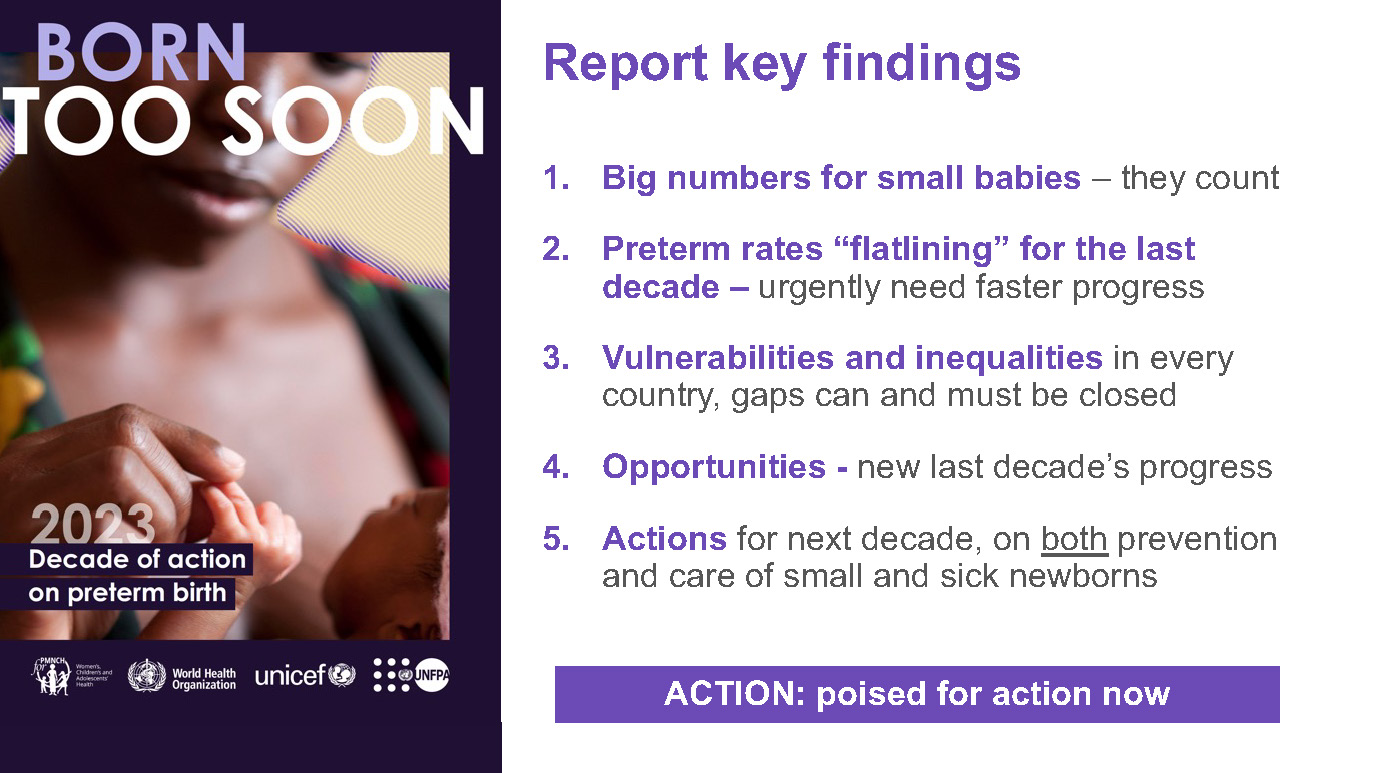Born Too Soon: decade of action on preterm birth
Every two seconds, a baby is born too soon. Every 40 seconds, one of those babies dies. In the last decade, preterm birth rates have not changed in any region of the world. Coverage is highly inequitable and challenges disproportionately affect those most vulnerable. For example, nearly 1 in 10 preterm babies are born in the 10 most fragile countries affected by humanitarian crises where accessing care is particularly challenging.
A new report – Born Too Soon: Decade of Action on preterm birth – has highlighted that while encouraging progress has been made to prevent and protect preterm birth, much more concerted action is needed. Published at the International Maternal Newborn Health Conference (IMNHC) in Cape Town, South Africa, Born too soon sounds the alarm on the silent emergency of preterm birth, long under-recognised in its scale and severity, which is impeding progress in improving children’s health and survival.
The report has been produced by the World Health Organization (WHO) and the United Nations Children’s Fund (UNICEF) together with PMNCH – the world’s largest alliance for women, children and adolescents.
A pledge from leaders in women’s health and rights
As a member of the PMNCH Health-Care Professional Associations (HCPA) constituency, FIGO has come together with the Council of International Neonatal Nurses (COINN), International Confederation of Midwives (ICM), International Council of Nurses (ICN) and International Paediatric Association (IPA) have issued a joint statement to wholeheartedly commit to work together to take bold action to reduce the burden of preterm birth in the coming decade.
On the urgent need for collaborative action, Director of FIGO’s Division of Maternal and Newborn Health Professor Bo Jacobsson, said:
The inequities in coverage and quality of health services for women around the world are hindering progress towards the prevention of preterm births and stillbirths. Health care professionals have a key role to play as part of multi-stakeholder efforts to scale-up proven tools and resources aimed at the prevention of preterm birth, and to ensure women and families receive high quality, respectful and person-centred care.
FIGO and our partners re-affirm our commitment that all women and families receive respectful, person-centred care, and that women’s and adolescents’ voices are respected. Through the joint statement, we call upon our governments to support us in this critical work and invest in strengthening the health workforce so that skilled health care providers are comprehensively available to be able to ensure respectful high quality care reaches every mother and family
Partnership and people power
A decade on from the 2012 Born Too Soon report, more than 70 organisations have come together to develop an updated report. The report has been developed by more than 140 individuals from 46 countries, spanning national governments, civil society, including parents’ groups, health-care professional associations, young people, academic and research organisations, multilateral organisations, donors and foundations, and the private sector. Parents and families have shared their deeply personal experiences of preterm birth; a moving reminder that behind every statistic is a story of a family and a community deeply impacted, often for a lifetime.
The 2023 report is a testament to the power of partnership. Together, we are united in our call for a healthier and more equitable future for millions of babies, women and families.
Ensuring quality care for these tiniest, most vulnerable babies and their families is absolutely imperative for improving child health and survival. Progress is also needed to help prevent preterm births – this means every woman must be able to access quality health services before and during pregnancy to identify and manage risks.
– Dr Anshu Banerjee, Director for Maternal, Newborn, Child and Adolescent Health and Ageing, WHO
To make progress on maternal and newborn health, we must address preterm birth. Please share the report widely with your networks, partners, colleagues and friends. Together, we have all the ingredients for success.
More about the report
The report includes updated estimates from WHO and UNICEF, prepared with the London School of Hygiene and Tropical Medicine, on the prevalence of preterm births. Overall, it finds that preterm birth rates have not changed in any region in the world in the past decade, with 152 million vulnerable babies born too soon from 2010 to 2020.

Preterm birth is now the leading cause of child deaths, accounting for more than 1 in 5 of all deaths of children occurring before their 5th birthday. Preterm survivors can face lifelong health consequences, with an increased likelihood of disability and developmental delays.
The report notes that only 1 in 10 extremely preterm babies (<28 weeks) survive in low-income countries, compared to more than 9 in 10 in high-income countries. Gaping inequalities related to race, ethnicity, income, and access to quality care determine the likelihood of preterm birth, death, and disability, even in high-income countries.
Southern Asia and sub-Saharan Africa have the highest rates of preterm birth, and preterm babies in these regions face the highest mortality risk. Together, these two regions account for more than 65% of preterm births globally. The report also highlights that the impacts of conflict, climate change and environmental damage, COVID-19, and rising living costs are increasing risks for women and babies everywhere. For example, air pollution is estimated to contribute to 6 million preterm births each year. Nearly 1 in 10 preterm babies are born in the 10 most fragile countries affected by humanitarian crises, according to a new analysis in the report.
Maternal health risks, such as adolescent pregnancy and pre-eclampsia, are closely linked to preterm births. This underlines the need to ensure access to sexual and reproductive health services, including effective family planning, with high-quality care in pregnancy and around the time of birth.